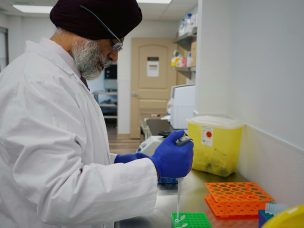February 14, 2024
Ferroptosis May Offer New Avenues for Triple-Negative Breast Cancer Treatment
A systematic review explores the promising connection between ferroptosis, a form of regulated cell death, and triple-negative breast cancer, offering new insights into prognosis and treatment strategies. By identifying potential biomarkers and therapeutic targets related to ferroptosis, this research opens avenues for personalized treatment approaches to this form of breast cancer known for its aggressive...
Predictive Power of Machine Learning in Breast Cancer Treatment Outcomes
A retrospective study used machine learning to predict treatment response and survival rates in breast cancer patients from an underserved, inner-city population. The study examined the impact of tumor subtypes and socioeconomic factors on outcomes. Machine learning models reveal no association between pathological complete response and patient demographics but highlight the significance of tumor subtypes...
Understanding NUDT5: A Step Forward in Fighting Triple-Negative Breast Cancer
New research shines a light on fighting a difficult type of breast cancer, known as triple-negative breast cancer, by focusing on an enzyme that protects these cancer cells. This discovery opens up possibilities for treatments that are not only effective but that may also be gentler on the body. Research identifies the enzyme NUDT5 as...
A New Way to Predict Breast Cancer Treatment Success
A preliminary study reveals that tiny particles released by cancer cells may predict the effectiveness of breast cancer treatment, particularly for those facing triple-negative breast cancer. This research offers a promising approach to personalizing treatment plans, potentially improving outcomes for patients and providing new hope to individuals and their families navigating this challenging diagnosis. Dealing...
Unlocking New Treatments for Triple-Negative Breast Cancer
A type of signalling molecule called filamin A may play a key role in the battle against triple-negative breast cancer. This research could lead to more personalized and effective treatments by targeting the unique ways filamin A influences cancer growth and spread, offering new hope for those affected by this type of cancer, which is...




